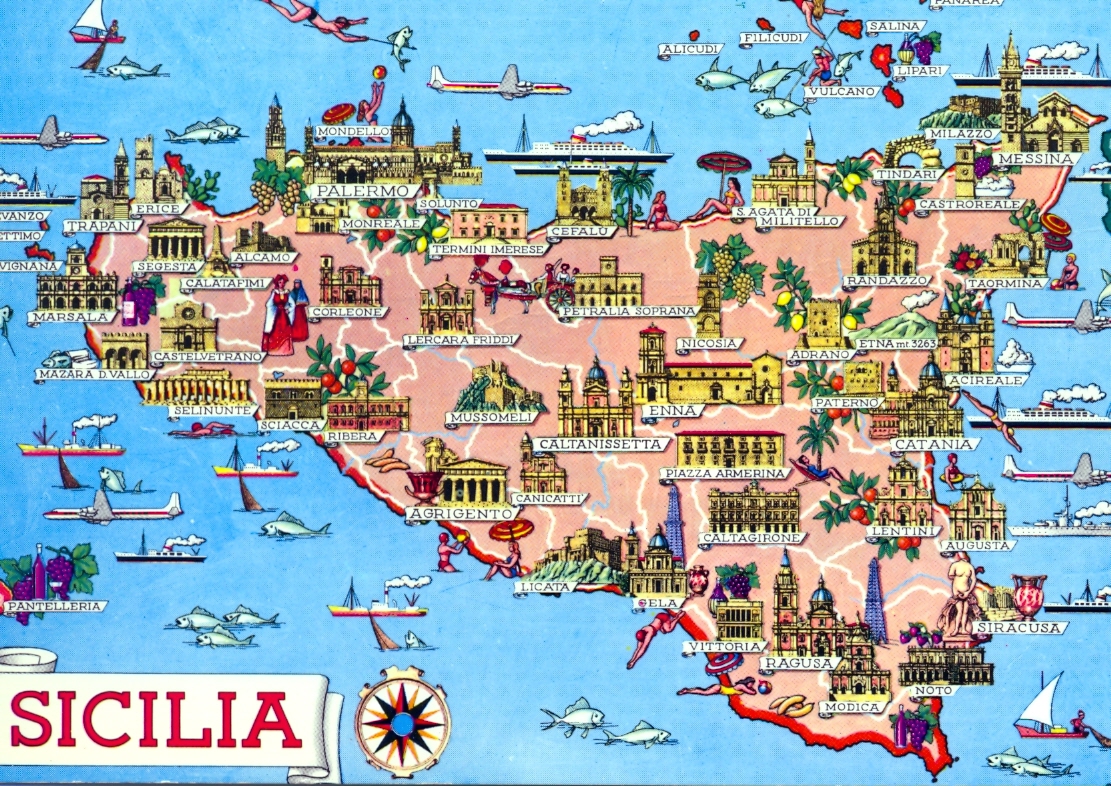
Let’s start our tour of the languages and dialects of Italy with one of the most spoken, especially abroad: Sicilian. Since 2010, Sicilian holds the official status of language and is spoken mostly in Sicily, which is in the south of Italy. According to the UNESCO, in fact, Sicilian is a “mother language” and it could be even older than Italian! Yes, it is possible indeed. In fact, we should not forget that Italian is “just” the dialect of Tuscany and it became the language of Italy only due to a series of socio-economic circumstances that occurred at the time, not because it was the prevalent language in Italy or the oldest.
Ever since the XIII century, Sicilian was, in fact, widely used even as a language of literature, long before Italian was. Later, Dante himself, in De Vulgari Eloquentia – writing in Latin – referrers to this “creek” of poets and intellectuals around the court of Federico II between 1166 and 1266, who writing in the vulgar language of Sicilian instead of the more elevated Latin, as La Scuola Siciliana – the Sicilian School. Those poets were simply functionaries of the court who were engaged in the political, but also intellectual and literary scene. This school of thought is especially important for the languages of Italy because it is the first time that a vulgar language, a language of the population, derived from Latin, and not Latin itself, is used as a literary means of expressions. Those vulgar languages were indeed considered vulgar and low, because they were spoken by the peasants; therefore, not worthy of any intellectual recognition. However, La Scuola Siciliana completely changed the status of vulgar languages by being used as an elevated language for poetry and literature. This set the stage for Dante and other writers to use the vulgar language of Tuscany as the language of literature, which later resulted in the Tuscan dialect being adopted as the official Italian language. Without La Scuola Siciliana, this would not be possible.
Sicilian is crucial not only because of its importance in the definition of vulgar languages as worthy languages, but also because of its rich heritage and history. Sicilian, in fact, is not derived from Italian, but from Latin itself. Thanks to the many occupations over the centuries, Sicilian was able to draw influence from many different languages: Greek, Latin, Arabic, French, Provencal, German, Catalan, Castillian, and, much later, even Italian. According to some studies, Sicilian could be the oldest Romance language. The language’s origin goes back centuries, but over the years, different versions of Sicilian were created according to geographical areas. Variation of Sicilian are spoken in Eastern, Western, and Central Sicily, as well as in the cities of Enna, Messina, Pantelleria, and the Eolie Islands.
Sicilian speakers take a lot of pride in their language and one of the reason is clearly because of its linguistic richness. Sicilian has its own grammar codification, vocabularies, and pronunciation rules. Throughout the years, Sicilian speakers started to create newspapers completely written in Sicilian and forums as the Linguasiciliana.org, in which journalist would write articles completely in Sicilian. In 2008, courses to learn Sicilian language were offered in seven different languages and in 2011, Nicola D’Agostino, Sicilian deputy, proposed a law about starting to teach the Sicilian language in schools all over Sicily.
This proposal does not only come from pride. The language is, in fact, on the list of endangered languages of the UNESCO. Even though there are more than 5 million speakers in the world, the language is slowly dying, as many other languages and dialects of Italy are. Italian is the main language of the new generation, which provides more unity, but at the same time decrees the disappearance of languages like Sicilian. The Centro di Studi Filoloici e Linguistici Siciliani – the Center of the Sicilian Linguistic and Philological Studies – is trying to promote the study and specialization in ancient and modern Sicilian, but the battle is tough. Various movements are trying to keep Sicilian alive, but the language is in a slow decline.
However, Sicilian is still very much alive in the United States, where millions of Sicilians immigrated to in the 19th and 20th century. Sicily, due to its desperate situation and the feeling of abandonment by the newly united Italy, was one of the major areas sending immigrants to the New World. In the 2000 census, more than 85 thousand people made up the Sicilian population in the United States. Here, the language is still predominant because Italian never substituted the dialect, and many immigrants never fully surrendered to English. In America, Sicilian was usually used in the community and in the households, instead of English. In this way, Sicilian was still understood and spoken by the following generations without it being compromised. And even today, what many Italian Americans learned from their parents is indeed Sicilian and not Italian. The community of Sicilian Americans is so big that they even established their own institute, the Sicilian Cultural Institute of America, which provides courses to all people of Sicilian heritage to maintain their language and culture alive.
It is very important then that we take care of this precious language, as for all the regional dialects of Italy. Even if the non-speakers of Sicilian should be engaged in the preservation of this language, because of its linguistic importance and wealth, but also for the important connection that it provides to the Americas and all of our co-citizens living overseas.
And let’s not forget: It might not be an official language in Italy, but without Sicilian we probably won’t even have Italian.



